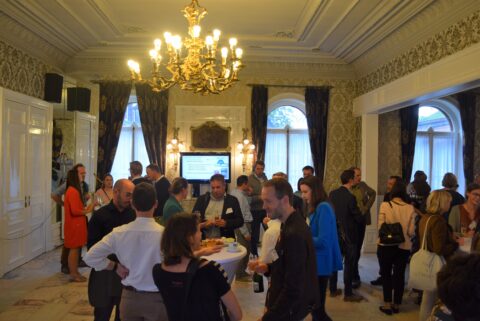
Press release Avamoplast
On June 24, 2022, Avamoplast obtained the ISCC PLUS certificate for the categories Bio-packaging, Bio-circular packaging and Circular packaging. This means that the producer of plastic packaging is now able to market PP and PE packaging with up to 100% circular, biocircular or biomaterial under the Mass Balance principle. This certification is part of Avamoplast's future plan to be a leader in sustainability.
Tom De Vlaminck, Operations Manager, explains: “Monomaterials have been our standard for years and for all our PET packaging we add recycled content in the raw material – called RPET – via thermoforming. For several years, all PET processed at Avamoplast has contained up to 50% of that recycled material (RPET). At the request of the customer, we can go up to 100%.'
Solution for food industry and medical sector
But recycled raw materials in injection molded packaging with PP and PE are not legally allowed in sectors with strict regulations, such as the food industry or the medical sector. For the production of PP and PE granules, fossil raw materials are traditionally used as the basic raw material.
The ISCC PLUS certificate and the Mass Balance granules now offer a solution for them. These granules are not based on fossil raw materials but, for example, chemically recycled PP (circular PP), used vegetable frying oil (bio-circular PP) or rapeseed oil (Bio PP). As a result, packaging for the food industry and the medical sector can henceforth be produced with PP of, say, biocircular origin. To what extent a packaging consists partly or completely of Mass Balance material is up to the customer.
Like green electricity
According to the Mass Balance principle, the producer of plastic granulates mixes a portion of circular or bio-based raw materials with raw materials of fossil origin at the start of production. The end product remains the same: PP and PE granulate as we know it today. With the difference that there is a part of non-fossil origin at the base.
The principle is similar to that of green electricity: the end product in your socket (electricity) is indistinguishable from conventional 'grey' electricity. However, anyone who invests in green energy at the source will receive the necessary 'green power guarantees'.
This is how it works with Mass Balance plastics. Only the percentage of circular or bio-based raw materials at the beginning of the chain receives a certificate. Thanks to the certificate, Avamoplast can now purchase, process and offer these to customers.
Plastic with impact
Because the circular and bio-based raw materials are processed in the same production process as conventional raw materials, they are also suitable for food. Moreover, no additional development or investment is required, which accelerates the demand for circular and bio-based materials. In summary, the principle of Mass Balance makes it possible – after that of PET – to increase the sustainability of PP and PE packaging to 100%.
Sustainability claim on your packaging
Avamoplast is one of the first packaging producers in the Benelux to offer this option. From now on, customers can claim – on the PP or PE packaging itself – that it consists of up to 100% recycled or bio-based plastic. With corresponding official logos of the ISCC PLUS guarantee. The percentage that you want to have certified must be between 20 and 100, but you determine the rest yourself and is also mentioned in the logo. In this way, the end consumer is correctly and transparently informed about the efforts made throughout the entire chain.
About Avamoplast
Avamoplast is a producer of mono-material plastic packaging. The family business focuses on the various sectors in which customization, production efficiency and automatic packaging processing is a top priority, such as the food and medical sector.
Avamoplast was founded in 1993 by André Van Moeseke based on his personal experience with – and passion for – plastic. It was André who saw the potential of plastic for food packaging. This later evolved into a specialization in the development and production of single-use plastic food packaging.
With this evolution, an internal need for more sustainability arose in an organic way. It was therefore quickly decided to focus on monoplastic and recycled raw materials.
For more info, visit www.avamoplast.be . Or follow us on LinkedIn.


